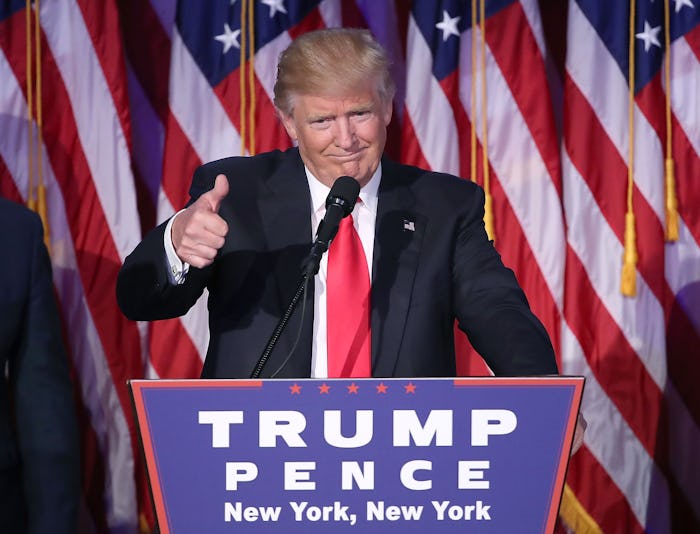
Was The Election A Whitewash? Election Night Stats Tell A Disturbing Story
For years, Republican Party members have been saying they need the support of more people of color. After Mitt Romney lost to President Obama in 2012, many Republicans felt they needed to capture the votes of African-Americans and Latinxs especially, in order to succeed in future presidential elections. But it turns out that's not true. Republican candidate Donald Trump managed to become our president-elect with support from mostly white voters. Was Trump's shocking presidential election a whitewash?
For some of us, Trump's campaign to "Make America Great Again" has always been code for "Make America White Again." He's called Mexican immigrants rapists, claimed he'd build a wall around the Mexican border, and has said he wants to ban Muslims from immigrating to the United States. So it's hard not to feel as though those who support Trump support these disgusting values as well.
And the statistics sadly show that these attitudes resonated with some white people. More than some, despairingly. Overall, 58 percent of white people voted for the trash-talking Republican, according to The New York Times' exit poll data.
Whites without a college degree were a huge factor in why Trump was elected — 67 percent of them voted for him. But they weren't the only ones:
And despite Trump's language that endorsed groping women without consent (sexual assault) — and multiple women alleging that he sexually assaulted them, which he firmly denied — the majority of white women chose Trump over Hillary Clinton. Data from the polls show 53 percent of white women chose Trump over the woman who could have been the country's first female president. The racial disconnect is huge, because just 4 percent of black women voted for Trump.
"It's like they chose upholding white supremacy over feminism," my dad said to me yesterday. Or, at least, over human decency and empathy.
CNN's Van Nash put it most eloquently on Election Night when he referred to white people's support of Trump as a "whitelash."
This was a whitelash. This was a whitelash against a changing country. It was a whitelash against a black president in part. And that's the part where the pain comes. And Donald Trump has a responsibility tonight to come out and reassure people that he is going to be the president of all the people he insulted, and offended, and brushed aside.
The polls show that a mere 8 percent of blacks voted for Trump. But even in a city as diverse and liberal as New York, there were people of color who, for whatever reason, voted for the businessman. A friend of mine who worked at a polling site in New York City wrote on Facebook that she saw Indian, Guyanese, Chinese, and Mexican people vote for Trump.
Some news organizations have reported on why whites' support of Trump isn't about race or gender.
New York Magazine reported that Trump was supported by many of the same working-class white voters who voted for Obama in 2012. The New York Times' Nate Colt wrote on Twitter that whites supporting Trump is "not all about racism."
While it may not be "a simple racism story," I don't think we can say it's not about race at all. Just because a person voted for one black president doesn't automatically exclude him or her from racism. That's like saying "I can't be racist because I have one black friend."
Another reason voters flocked to Trump is because they are disgusted with politicians, and they (in a strange and somewhat silly move considering we're talking about the highest elected office on can hold) backed Trump because he has no political experience. Those who were most discontent largely voted for Trump, Associated Press poll data shows.
Maybe these reasons are true for some voters. I've always wanted to believe in the best of people. But I'm not naïve.